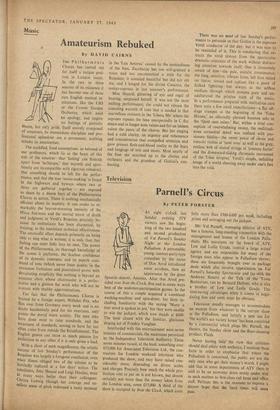Music
Amateurism Rebuked
By DAVID CAIRNS
The muddled, fond assumptions, so beloved of our professors, which lie at the heart of this cult of the amateur—that 'feeling' can flourish apart from 'technique,' that warmth and spon- taneity are incompatible with rigorous rehearsal, that something should be left for the perfor- mance, and that the true 'music-making' is found in the highways and byways where two or three are gathered together — are exposed as sham by a dozen bars of the Philharmonia Chorus in action. There is nothing mechanically efficient about its mastery. It can evoke so re- markably the heaven-storming intensity of the Missa Solemnis and the mortal terror of death and judgment in Verdi's Requiem precisely be- cause its enthusiasm has been sharpened, by training, to the maximum technical effectiveness. The emotion-al effect depends primarily on being able to sing what is written; it is only then that feeling can enter fully into its own. The power of the Philharmonia, its thorough knowledge of the scores it performs, the fearless confidence of its dynamic contrasts, and its superb com- mand of tone (which never loses quality in the extremest fortissimo and pianissimo) prove with devastating simplicity that nothing is beyond an amateur choir whose choirmaster is a perfec- tionist and a glutton for work who will not be content with shabby approximations.
The fact that the Philharmonia Chorus is trained by a foreign expert, Wilhelm Pitz, who flies over from Germany every week and is no doubt handsomely paid for his exertions, only points the moral more acutely. The men who have done most to raise standards, and the awareness of standards, among us have far too often come from outside the Establishment. The English genius can show as much passion for perfection as any other if it is only given a lead.
With a choir of such magnificence, the artistic success of last Sunday's performance of the Requiem was largely a foregone conclusion, even when illness obliged two of the soloists to be hurriedly replaced at a few days' notice. The substitutes, Amy Shuard and Luigi Ottolini, were in many ways better than their colleagues. Christa Ludwig (though her courage and ex- cellent sense of pitch redeemed a nasty moment in the 'Lux Aeterna' caused by the unsteadiness of the bass, Zaccharia) has too soft-grained a voice and too uncommitted a style for the Requiem; it sounded beautiful but did not stir me, and I longed for the divine Cossotto, the mezzo-soprano in last summer's performance.
Miss Shuard, glittering of eye and regal of bearing, surpassed herself. It was not the most melting performance; she could not release the consoling warmth of tone that is needed in that marvellous moment in the `Libera Me' where the soprano repeats the tune unexpectedly in C flat major and in longer note values and for an instant calms the panic of the chorus. But her singing had a cold clarity, an urgency and vehemence and concentration that compelled attention and gave present flesh-and-blood reality to the fears and longings of text and music. Most nearly of the four she matched up to the chorus and orchestra and the grandeur of Giulini's con- ducting. There was no need of last Sunday's perfor- mance to persuade us that Giulini is the supreme Verdi conductor of the day; but it was nice to be reminded of it. This is conducting that ex- tracts the vivid utmost from the spectacular dramatic contrasts of the work without distract- ing attention towards itself. One is immensely aware of him—the pale, ecstatic countenance, the long, sensitive, vibrant form, left foot raised on tiptoe, tensed and radiant like a piece of forked lightning—but always as the selfless medium through which streams pure and un- adulterated the pristine truth of the music. In a performance prepared with meticulous care there were a few small imperfections—a flat off- stage trumpet at the beginning of the 'Tuba Mirum,' an affectedly phrased bassoon solo in the 'Quid sum miser.' But, within a total con- ception of overwhelming sweep, the multitudi- nous orchestral detail was realised with pas- sionate fidelity—the sweet peace of oboes and tremolo violins at 'inter coves' as well as the grey, restless web of muted strings at 'tremens factus' and the downward-sliding chromatic movement of the Tiber scriptus,' Verdi's simple, unfailing image of a world sheering away under one's feet into the void.










































 Previous page
Previous page